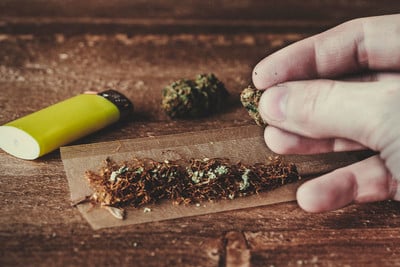.

Joints, Blunts, and Spliffs: Their Differences Explained
Spliffs, joints, blunts... they're all just ways of smoking weed, right? While it's true the usage of these terms is fluid, each does refer to a specific and distinct experience. Keep reading to find out more.
Do you know what the difference between a joint and a spliff is? How about the difference between a joint and a blunt? These terms are often used interchangeably—and that's fine; we're not here to change your use of language. However, some people use these words to describe specific ways of smoking. While it's not important what you call them, knowing your options is beneficial. After all, more options equals more ways to enjoy your favorite herb.
Below, we'll break down the differences between joints, spliffs and blunts before outlining the pros and cons of each.
Contents:
The Lowdown on Joints, Blunts, and Spliffs
The differences between joints, spliffs and blunts are minor but still important. One is tobacco-free, one uses tobacco inside, and another uses tobacco pulp as a wrap to become a psychoactive cigar.
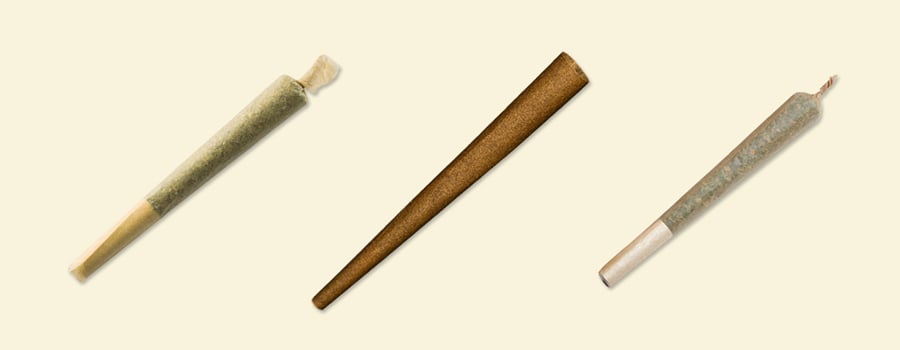
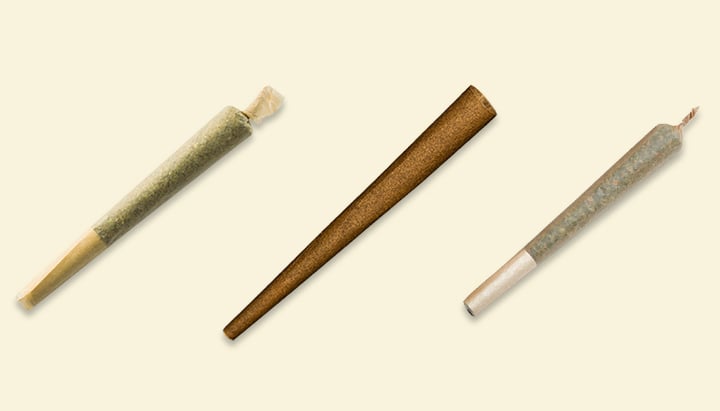
What Is a Joint: Defining a Joint
Joints are perhaps the archetypal image of cannabis smoking and are often depicted within media, art, and music alongside the classical stoner stereotype. If you started smoking cannabis before the rise of vapes, dabs, and edibles, chances are, you smoked a 'joint' while chilling with friends at a local park or woodland.
Joints are often sold in dispensaries as "pre-rolls" and are essentially the cannabis version of a tobacco cigarette. Joints are very simple constructions; the only ingredients needed are cannabis flower and rolling paper. The dried weed is ground up with a handheld or electronic grinder to make the rolling process easier.
The plant material is then placed on rolling paper before being shaped into a cone or straight joint.
What Is a Blunt: Dissecting a Blunt
Blunts are the cigars of the cannabis world and probably offer the most powerful high out of all the options—depending on the way they are rolled. Unlike spliffs and joints, you don't use rolling papers to construct blunts. They are either rolled using specialized blunt wraps made out of tobacco pulp or hollowing out a cigar and using the outer layer to contain your weed. More creative options also involve using dried and processed cannabis leaves as a blunt wrap.
The presence of tobacco within many blunt wraps adds a level of stimulation that many smokers appreciate. Blunts can sometimes be looked at as a high-end way to smoke and are perfect for celebrating special occasions. You can use high-quality cigars to form a blunt wrap, resulting in an immaculate shape and unparalleled smoothness with each toke.
Blunts work best when passed around and shared with friends in a relaxed environment. Whereas spliffs and joints are often used casually throughout the day for a quick high, the longer preparation time and more potent effects of a blunt make them more suited for important events and dedicated smoke sessions.
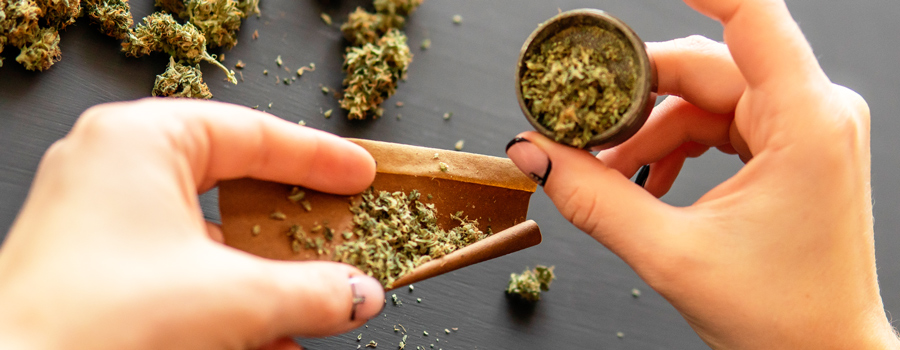
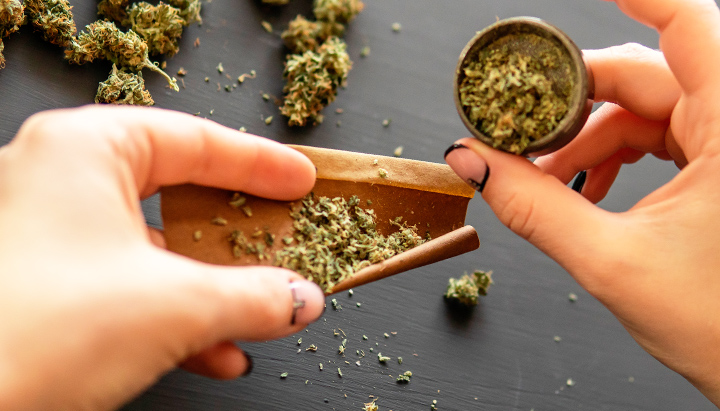
What Is a Spliff: Unravelling a Spliff
Spliffs are very similar to joints and are made in an almost identical fashion. However, the one key ingredient that sets them apart is tobacco. Interestingly, many US smokers may be unfamiliar with this smoking method and may even look upon the addition of tobacco as some kind of stoner sacrilege. Despite this, spliffs are usually the go-to method of consumption for European weed-lovers.
Spliffs are made using various papers, from flavorless and small to very long and flavorful. Weed is also ground up before rolling to optimise ease, shape, and smoothness. Tobacco is then added to the spliff by mixing it into the ground-up weed or layering it into the spliff.
The Pros and Cons and Joints, Blunts, and Spliffs
Each of these smoking methods has distinctive pros and cons. Most seasoned smokers know their preferences and have clear arguments to back them up. But if you're new to smoking or just looking for a change, the following section might help you determine which is a good fit for you.
The Benefits and Drawbacks of Joints
The pros of joints are:
- Simple: The lack of necessary equipment and the ease with which that equipment can be acquired means joints are probably the simplest of the three methods.
- Less harmful: Smoking cannabis without tobacco still presents many health risks; however, taking tobacco out of the equation reduces the impact and certainly means you won't develop a nicotine addiction.
- Purer flavors and effects: A joint focuses on the tastes and influence of your chosen cannabis, offering an unadulterated experience that isn't tainted by tobacco. For enthusiasts who value purity, this is a great boon.
The cons of joints are:
- Rolling joints well can be challenging: While they are simple in principle, creating a well-rolled joint that burns evenly can be tricky, especially if you lack the dexterity.
- Requires a lot of weed: Because weed is the only ingredient that you need to fill your joint, you'll end up using a lot of herb.
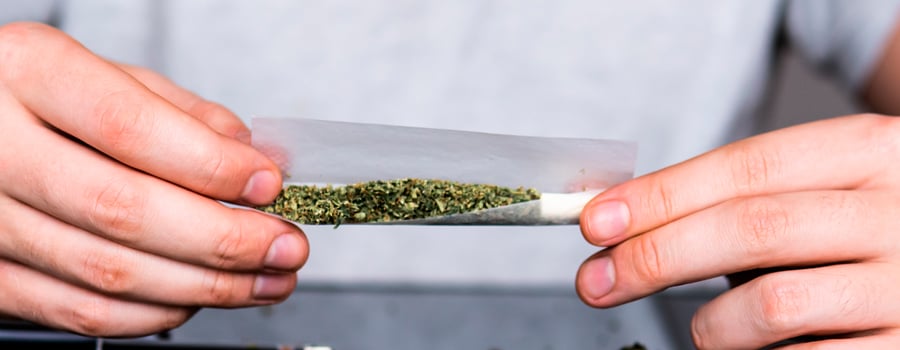
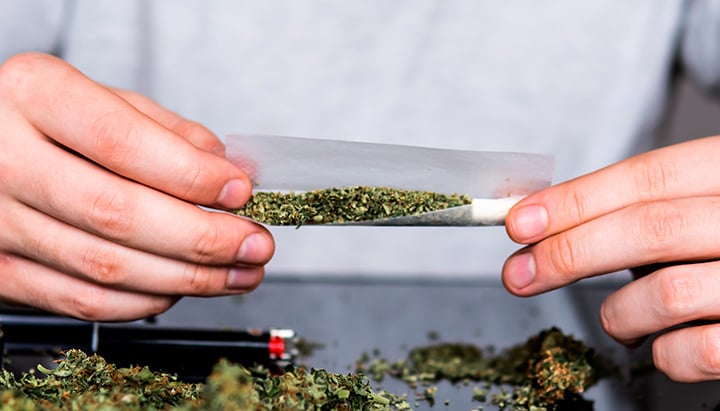
The Advantages and Disadvantages of Blunts
The pros of blunts are:
- Great for sharing and social events: Blunts are certainly a party vibe. Few people choose to roll up a blunt at home, alone, and spend the evening smoking away. But in a social setting with a lot of people, a blunt is the perfect centerpiece.
- Very potent: There's a lot of weed in a blunt, and so they end up being very strong. That said, as long as you know what you're doing, you'll have a great time.
The cons of blunts are:
- Use a lot of weed: Again, you need a lot of weed to roll a blunt, and outside of special occasions, it's probably not the most efficient use of your herb.
- Includes tobacco: Blunts contain nicotine (because of the wraps), and smoking one comes with the same health implications of smoking tobacco, including addiction.
The Pros and Cons of Spliffs
The pros of spliffs are:
- They roll well: Thanks to the added tobacco, rolling a spliff that looks good and burns evenly is easy.
- Doesn't require too much weed: As you can fill spliffs out with tobacco, you don't need to pack them entirely with weed, meaning your bud goes further.
The cons of spliffs are:
- Tobacco is very harmful: You probably already know this, but tobacco is packed with carcinogens and other harmful compounds. Plus, it's highly addictive.
- Influences the taste: Tobacco also overshadows many of the subtler flavors in cannabis, so you will somewhat spoil the terpene profile of weed by adding tobacco to the mix.
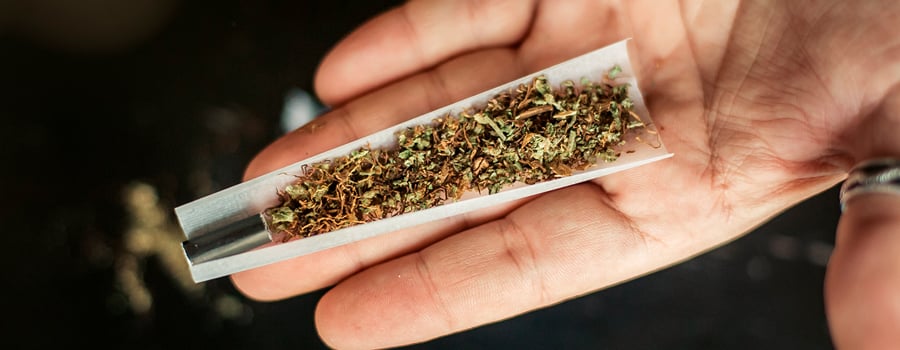
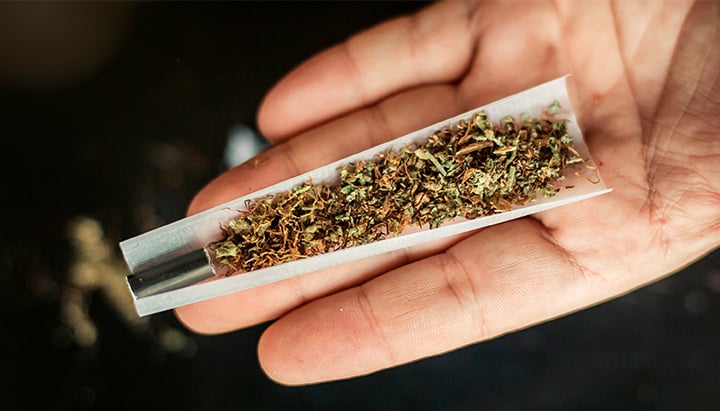
What Goes Into A Roll? A Step-By-Step Guide To Joints, Blunts, and Spliffs
Rolling up joints, spliffs, and blunts isn't too difficult, but it does take practice. If you haven't done it before, don't expect to create something exceptional right away. It's a delicate process that is easy enough to pick up but takes time to master.
Rolling A Joint
To roll a joint, you need:
- Papers
- Filter tips (roach)
- Weed
- A grinder (preferably)
Here's how you do it:
- Grind the weed.
- Roll the filter card into a roach. Place this inside the left or right end of the paper (your choice).
- Pour the weed evenly into the paper.
- Roll the joint. Try to disperse the weed evenly throughout, and don't make it too tight or loose.
For more detailed instructions, check out our dedicated article about how to roll a joint.
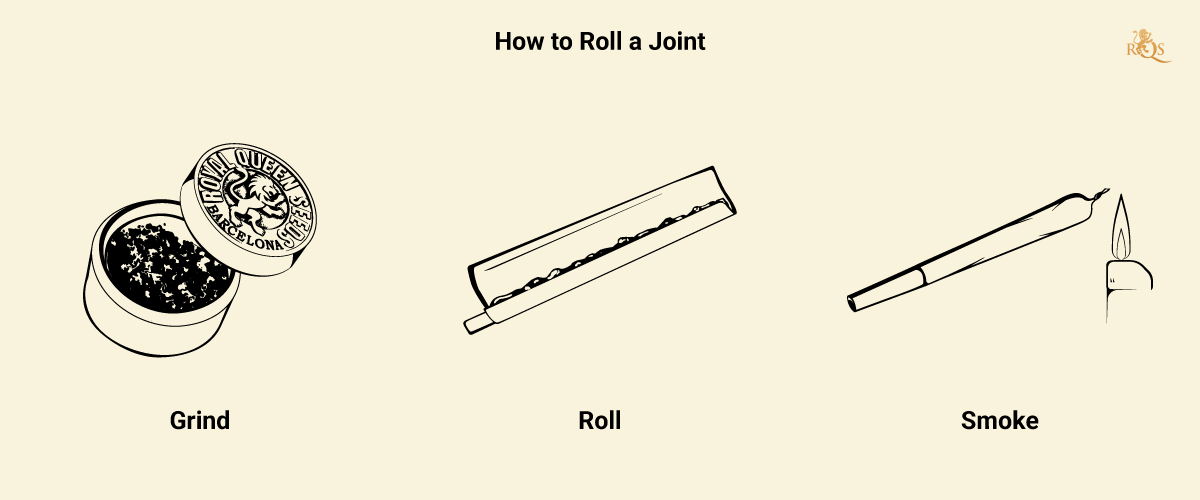
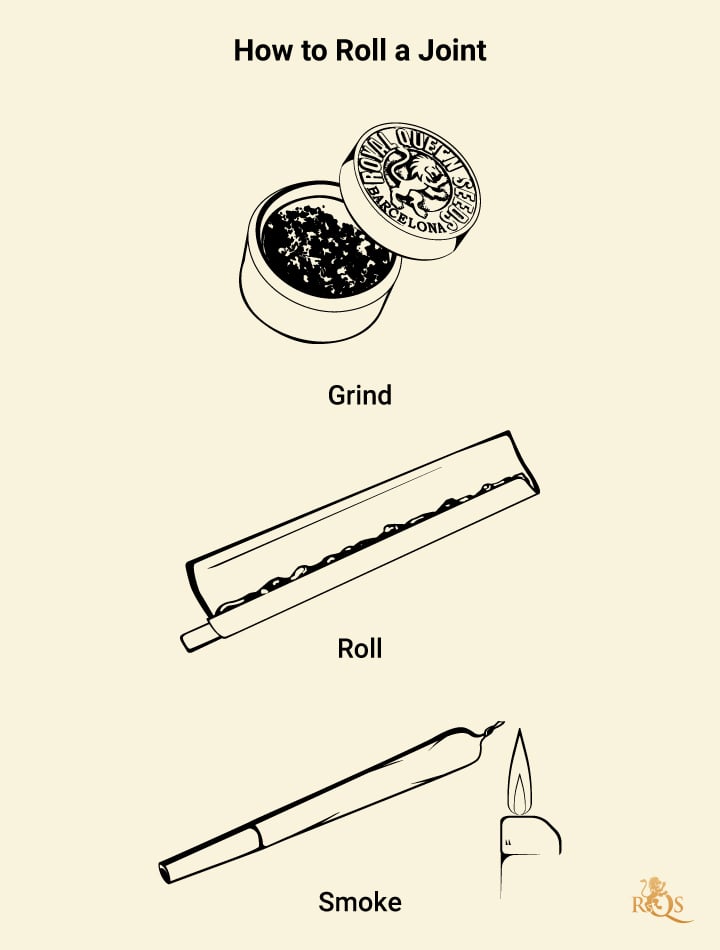
Crafting A Blunt
Rolling a blunt seems like it would be easy, but it can actually be quite tricky to get right. We're going to assume you're using a blunt wrap for the following instructions.
You" ll need:
- Blunt wrap
- Weed
- Grinder
Here's how you do it:
- Grind the weed.
- Empty it evenly into the blunt wrap.
- Roll it as tightly as possible, dispersing the weed throughout. Stick it together.
For more detailed instructions, check out our dedicated guide about how to roll a blunt.
Making A Spliff
Spliffs are probably the easiest of the three to roll well.
You'll need:
- Papers
- Tobacco
- Grinder
- Weed
- Filter tip (roach)
Here's how you do it:
- Grind the weed.
- Roll your roach and place it at your preferred end.
- Put a small amount of tobacco on your paper. Fluff it out and ensure it's not compact.
- Empty the ground weed onto the tobacco.
- Place more tobacco on top of the weed.
- Roll. The softness of the tobacco should make rolling it fairly easy. Tuck and stick.
Joints, Blunts, and Spliffs: Which Is Your Favorite?
Now you're fully clued up about the joints vs spliffs vs blunts debate. And although It doesn't matter what you call them *most use the terms interchangeably), it's still worth knowing that these different smoking methods exist.
After all, if you've not tried each one before, how do you know which is your favorite? Though similar, they all have slightly different characteristics, making them distinctive in their own right. Who knows, maybe you'll find a new front-runner.






























